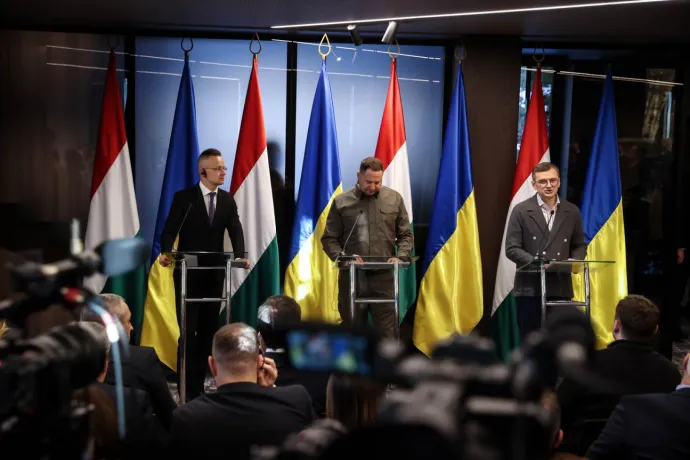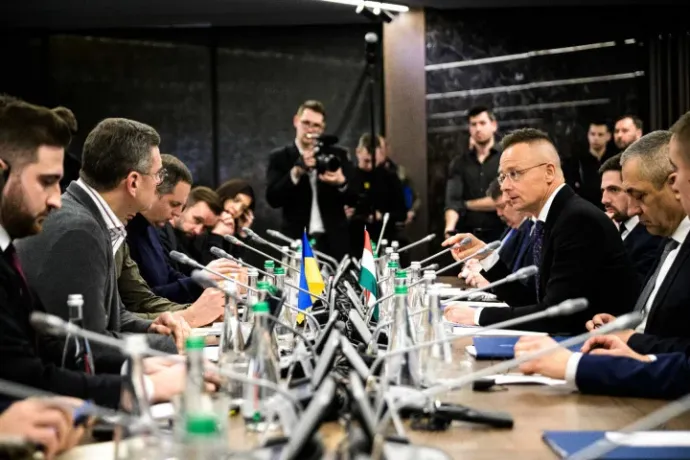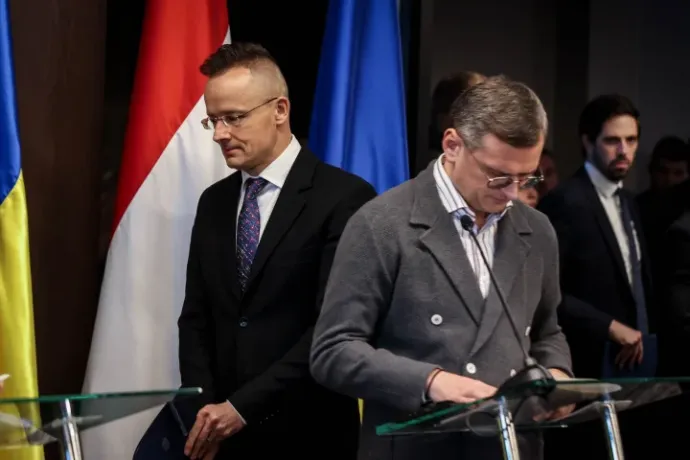
- For the first time since the beginning of Russia's war against Ukraine, the Hungarian and Ukrainian Foreign Ministers met for official bilateral talks in Uzhhorod, Ukraine on Monday.
- Hungarian Foreign Minister Szijjártó stated: we stand by Ukraine's territorial integrity and sovereignty.
- The Hungarian Foreign Minister said that the 50 billion euro assistance from the EU – which Hungary has vetoed for the time being – will not be decided in negotiations between Kyiv and Budapest, but in Brussels. He also evaded the question about supporting Ukraine's EU membership in principle.
- The Hungarian Foreign Minister said that the amendment of the Ukrainian minority law was an important step, but added that the dispute, which has been an obstacle to good relations for years, has not yet been resolved.
- Didn't Petőfi and Rákóczi want peace? – the head of the Ukrainian presidential office, Andriy Yermak, asked, noting that Ukraine had spent a lot of time negotiating with Russia, but in the end Russia still ended up attacking them.
- According to Ukraine, peace cannot be based on a frozen conflict, and territorial concessions are out of the question.
- The talks were described as an important step by both sides, but it is clear that the disputes – which also depend on the relationship between Hungary and the EU – are not yet over.
"It's been almost two years since the war started: we stand by Ukraine's territorial integrity and sovereignty. We want peace in our neighbourhood," Hungarian Foreign Minister Szijjártó said at a joint press conference with his Ukrainian counterpart Dmitro Kuleba in Uzhhorod, which was also attended by the head of the Ukrainian Presidential Administration, Andriy Yermak. "There is no issue that cannot be resolved through bilateral dialogue. The discussion was characterised by openness, constructiveness and sincerity," Kuleba concluded.
The Ukrainian Foreign Minister and Szijjártó had already met in Brussels in December and spoke for an hour, but this was the first time they held formal bilateral talks since the start of Russia's war against Ukraine.
Kuleba thanked Hungary for the humanitarian aid it had provided for his country. He said the main issue was Ukraine's Euro-Atlantic integration. "We are starting from the premise that an EU member Ukraine would best serve Hungary's interests" he said.
As for the debate on Ukraine's minority law, he said that it was a very old story. "We intend to regulate this issue in good conscience. Our starting point is that by restoring the situation to what it was before 2017, the Education Act is paving the way for EU membership. I think we made the right decision, and the Hungarians in Transcarpathia have also welcomed it." There are still some details to be clarified, which the parties will discuss within the framework of a bilateral dialogue in order to definitively resolve the issue, the Ukrainian Foreign Minister added.

"I would like to thank Andriy and Dmytro for their hospitality", Szijjártó began his reply. He also thanked a person who was not present, the governor of Transcarpathia, Viktor Mikita, who, according to Szijjártó, had done a lot to clarify the situation. "Distorting the Hungarian position is a favourite sport of a certain section of the international media", he said. "Without the governor, it would not have been possible to handle these artificial attempts intended to create tension," he said. He stressed that “Hungary stands by the territorial integrity and sovereignty of Ukraine.”
Prior to their meeting, Szijjártó also visited a cemetery where some of those who had died in the war are buried. The Foreign Minister said that everything must be done to achieve peace. He described that more than 20,000 Ukrainian children are attending 1,558 Hungarian schools and kindergartens in Hungary; he spoke about Hungary's humanitarian efforts, including those to rebuild hospitals; and having hosted 14,000 Ukrainian children in camps in Hungary.
The Foreign Minister then turned to the minority law, noting that the measures curtailing rights had been introduced gradually, which is why there was a dispute between Ukraine and Hungary. However, this downward spiral was halted by the amendment of the Ukrainian minority law in December. "We are requesting that the Hungarian minority in Transcarpathia be given back the rights they had before 2015:
- that they be able to take their school-leaving exams in Hungarian,
- that the status of national minority schools be restored,
- that they be allowed to use the Hungarian language without restriction in higher education, culture, public administration and community life”
– he said, listing the needs of the Hungarian minority.
Later on, in response to a journalist's question, Szijjártó stated: "We do not see the issue of national minorities as having been resolved at all. The Ukrainian law passed at the end of last year deserves respect, it put a stop to an 8-year spiral. "We have outlined the points which we would consider a guarantee for returning to the pre-2015 situation", he said, adding that there will be an intergovernmental agreement to this end, “and we hope it will be crowned with success.”
The €50 billion question
Whether the EU will finally provide the €50 billion in assistance over the next four years is a key issue for Ukraine. Hungary has vetoed the budget review, but it remains to be seen how the next round of talks will go in Brussels on 1 February. Szijjártó made it clear that this is not a bilateral issue between Kyiv and Budapest. "It will be discussed in Brussels," the Foreign Minister said, noting that “Hungary is offering all its abilities to help Ukraine live in peace again.”
Do you support Ukraine's EU membership? – was one question, to which Szijjártó replied:
"We have a lot of discussions in Brussels about what the EU should look like in the future. These debates are necessary, so that we can make an informed decision" – the Foreign Minister said, evading the question, although the question was not about the concrete implementation, but about the support for accession in principle.
Szijjártó said that over the past two years as well as in the current negotiations, Hungary has respected Ukraine's territorial integrity and it continues to represent this point of view.
Practical projects to advance
A new border crossing may soon open on the border between Hungary and Ukraine, at Nagyhódos – Szijjártó said that they are very close to it being completed. There also may be a new bridge built on the Tisza river soon.
Szijjártó expressed his thanks that the oil – which comes from Russia, although Szijjártó did not utter this word – has been able to enter Hungary unhindered via Ukraine.
We have a lot of work ahead of us, but we are ready to continue working together, Szijjártó concluded his remarks before taking questions from journalists, followed by a short statement from Andriy Yermak.
Yermak: We can see where negotiations with Moscow have led
The head of the Ukrainian Presidential Office spoke about the visit to the cemetery. "I would like to remind you of the words on the tombstone of one of the fallen soldiers: 'I am going so that my children will not see the horrors of war'" – Róbert was a native Hungarian who died for Ukraine, Yermak noted. “I believe that Hungary's contribution to peace will be the foundation on which to build relations between the two countries.”
"We are interested in a meeting between the Hungarian Prime Minister and the Ukrainian President. We took a very firm step in this direction today" – Yermak said, explaining that this could open a new chapter in relations between the two countries.
He slightly tempered Hungary's position on the importance of peace talks with Russia – which Szijjártó was less vocal about this time. "We had 200 negotiations with Russia: in Normandy, then the Minsk Agreement, and you can see where it has gotten us." Yermak said that even though they had signed 11 agreements, “Russia was preparing for an invasion that whole time, it simply used the time to prepare for an invasion.”
Referring to Hungary's pro-peace stance – which is the Hungarian government's reason for opposing Western arms shipments – he asked:
"Didn't Ferenc Rákóczi and Sándor Petőfi want peace? Nobody wants peace as much as the Ukrainians. But we want a just peace, not a peace based on a frozen conflict."
He made it clear that Ukraine cannot make territorial concessions to Russia in exchange for peace. Kyiv has previously stressed that this would only be an invitation to another war, and that Russia would only build up strength for the next few years.
Were Covid and the war the reason why there has been no agreement before?
Telex asked Kuleba why the December amendment to the minority law was not passed earlier if it had been an obstacle to Hungarian-Ukrainian relations for years.
According to the Ukrainian Foreign Minister, they had been examining the matter for years, then Covid came, then the war, and now they had reached the stage where they were able to amend the law. While Szijjártó suggested that this was only the beginning of the road towards a return to the pre-2015 situation when it comes to minority rights, Kuleba stressed that the substantial change had been made, adding that all further issues would be settled bilaterally and said that the issues raised had been discussed at today's meeting.

Preparations underway for an Orbán-Zelensky meeting
Kyiv hopes that the talks could be a preparation for a meeting between Volodymyr Zelensky and Viktor Orbán in Kyiv. The Ukrainian President would also be keen for the Hungarian Prime Minister to visit Irpiny and Bucha near Kyiv, where the Russian army committed war crimes against civilians during the first month of Russia's invasion of Ukraine launched on 24 February 2022. Orbán had previously refrained from assigning responsibility for the massacre to Russia. However, President Katalin Novák's visit to the site last summer was a sign of change.
The rebuilding of relations between Budapest and Kyiv is starting from a low point due to differing perceptions of the Russian aggression, but relations have been frosty for ten years over Ukraine's minority law, although December's amendments may provide grounds for rapprochement. Pressure from the EU – the fate of the frozen funds – and even from his own potential party allies could prompt Orbán to signal a willingness to negotiate, but the signs have suggested that a spectacular turnaround was unlikely.
In the past two years, Szijjártó has been to Moscow several times: he attended a conference, held talks with Sergey Lavrov, and Viktor Orbán was the only EU leader other than the Austrian chancellor to meet with Vladimir Putin in Beijing. According to the Hungarian government, this is part of their strategy for peace, because it keeps the channels of communication open, unlike the pro-war countries, which are helping Ukraine defend itself against Russian aggression by supplying arms.
The Hungarian government interprets Western arms supplies as a prolongation of the war – Hungary even refuses to allow supplies from its NATO allies to Ukraine pass through its territory – and has been calling for immediate peace talks between Ukraine and Russia, although Moscow, which controls the eastern part of Ukraine and has unilaterally annexed the territories, has not come up with any substantive proposal.
For more quick, accurate and impartial news from and about Hungary, subscribe to the Telex English newsletter!